Following the publication of “An Appeal for Human Rights” on March 9, 1960, students at Atlanta’s historically black colleges waged a nonviolent campaign of boycotts and sit-ins protesting segregationist laws that excluded them from white areas in restaurants, theaters, parks and government buildings. Hundreds of black people were arrested that year, including the Rev. Martin Luther King Jr., before white leaders relented and desegregated Atlanta’s facilities. Here is a selection of Associated Press photos showing events related to the Atlanta Student Movement against racial inequality and exclusion.
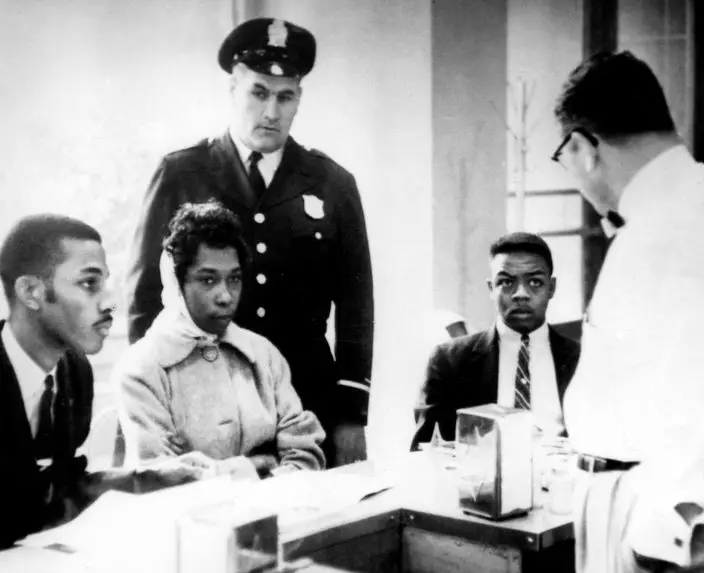
FILE - In this March 16, 1960 file photo, Victor Cobb, right, the manager of a dining room in Atlanta's Trailways Bus Terminal, asks African American sit down demonstrators to leave his lunch counter, in Atlanta. Following the publication of "An Appeal for Human Rights" on March 9, 1960, students at Atlanta's historically black colleges waged a nonviolent campaign of boycotts and sit-ins protesting segregation at restaurants, theaters, parks and government buildings. (AP Photo, File)
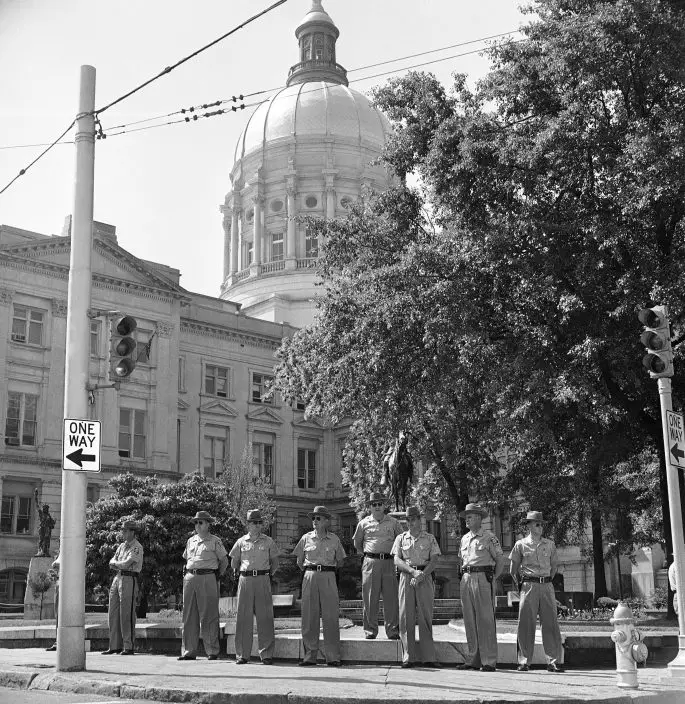
FILE - In this May 17, 1960 file photo, state troopers stand guard at the state capitol, in Atlanta awaiting a scheduled march on the building by black demonstrators in observance of the sixth anniversary of the Supreme Court's school desegregation decision. Following the publication of "An Appeal for Human Rights" on March 9, 1960, students at Atlanta's historically black colleges waged a nonviolent campaign of boycotts and sit-ins protesting segregation at restaurants, theaters, parks and government buildings. (AP Photo, File)
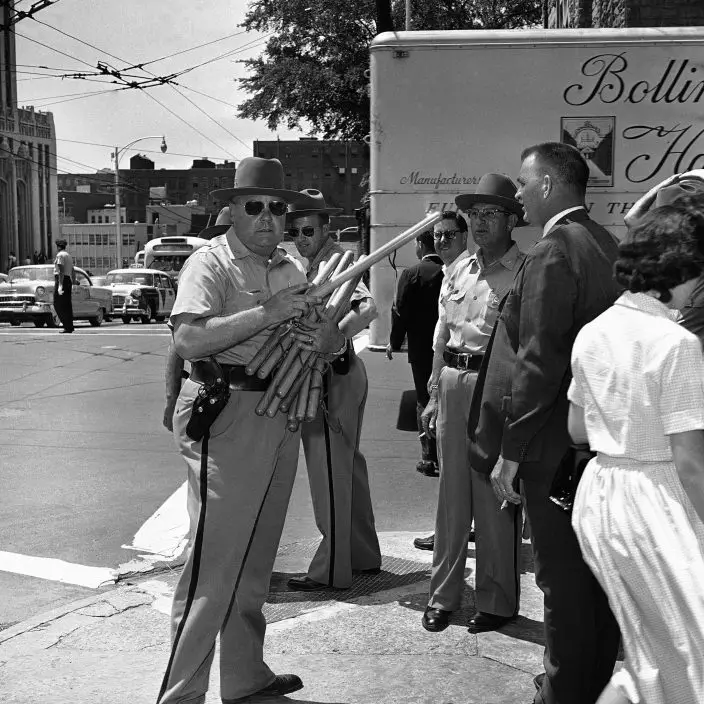
FILE - In this May 17, 1960 file photo, a state trooper passes out billy clubs to other troopers as 2,000 blacks started a march toward the state capitol in Atlanta, in observance of the sixth anniversary of the U.S. Supreme Court's school desegregation decision. Following the publication of "An Appeal for Human Rights" on March 9, 1960, students at Atlanta's historically black colleges waged a nonviolent campaign of boycotts and sit-ins protesting segregation at restaurants, theaters, parks and government buildings. (AP PhotoHorace Cort, File)
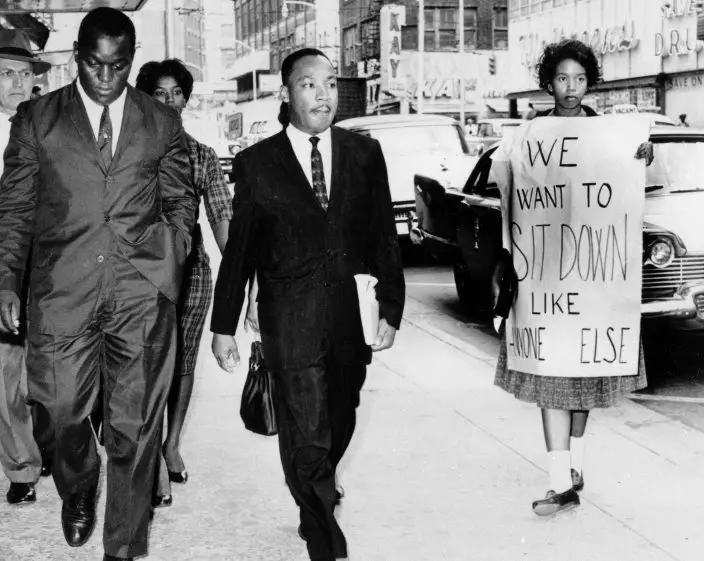
FILE - In this Oct. 19, 1960 file photo, Dr. Martin Luther King Jr. under arrest by Atlanta Police Captain R.E. Little, left rear, passes through a picket line outside Rich's Department Store, in atlanta. On King's right are Atlanta Student Movement leader Lonnie King and Spelman College student Marilyn Pryce. Holding the sign is Spelman student activist Ida Rose McCree. Following the publication of "An Appeal for Human Rights" on March 9, 1960, students at Atlanta's historically black colleges waged a nonviolent campaign of boycotts and sit-ins protesting segregation at restaurants, theaters, parks and government buildings. (AP Photo, File)
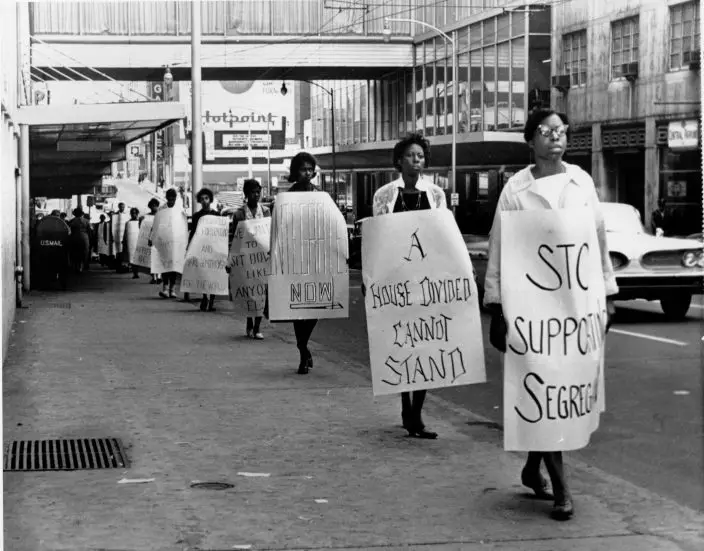
FILE - In this Oct. 19, 1960 file photo, Black activists are seen picketing outside Rich's department store protesting against segregated eating facilities at one of its lunch counters in Atlanta, Ga. The activists who had taken seats inside the store were arrested. Following the publication of "An Appeal for Human Rights" on March 9, 1960, students at Atlanta's historically black colleges waged a nonviolent campaign of boycotts and sit-ins protesting segregation at restaurants, theaters, parks and government buildings. (AP Photo, File)
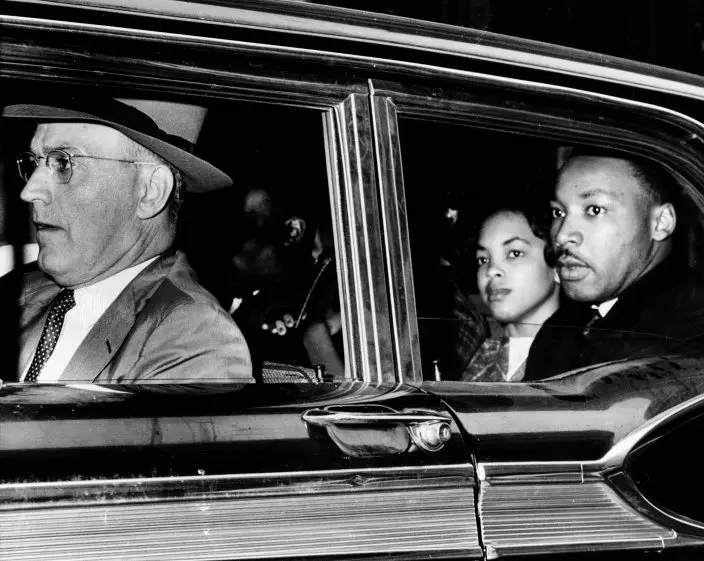
FILE - In this Oct. 19, 1960 file photo, Dr. Martin Luther King Jr., right, looks out the window of a police car as he and Spelman College student Agnes Blondean Orbert, arrested with him at Rich's Department Store, are taken to jail, in Atlanta.. Driving the car is Atlanta Police Capt. R.E. Little. Following the publication of "An Appeal for Human Rights" on March 9, 1960, students at Atlanta's historically black colleges waged a nonviolent campaign of boycotts and sit-ins protesting segregation at restaurants, theaters, parks and government buildings. (AP Photo, File)
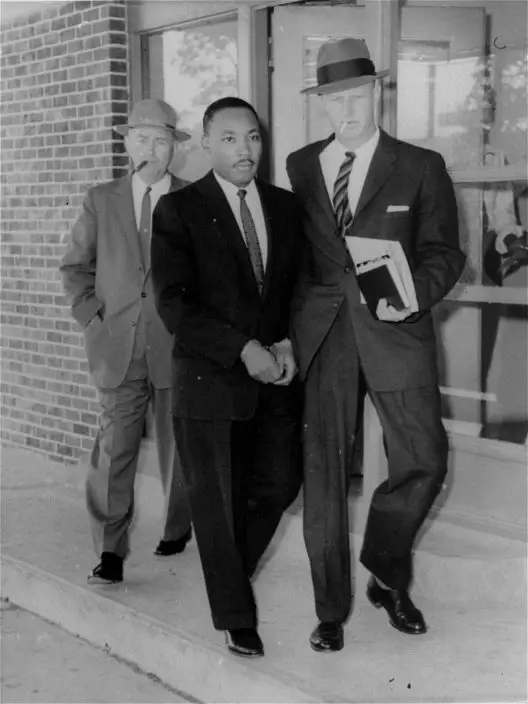
FILE - In this Oct. 25, 1960 file photo, Rev. Martin Luther King, Jr., integration leader, is escorted from the Atlanta, Ga. jail by two unidentified officers as he is taken to neighboring DeKalb county courthouse for a traffic hearing. Following the publication of "An Appeal for Human Rights" on March 9, 1960, students at Atlanta's historically black colleges waged a nonviolent campaign of boycotts and sit-ins protesting segregation at restaurants, theaters, parks and government buildings. (AP PhotoHorace Cort, File)
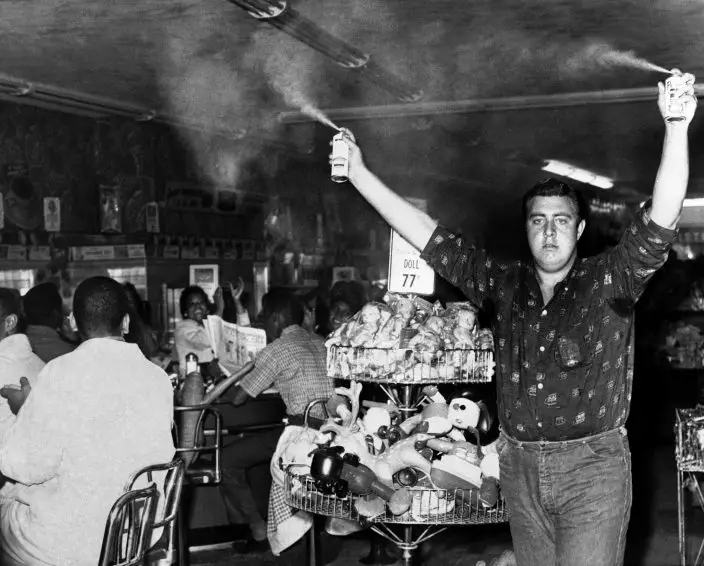
FILE - In this Oct. 20, 1960 file photo, Woolworth's customers closed its main downtown store in Atlanta., after white youth identified as Harold Sprayberry, 21, of Atlanta, walked along lunch counter area spraying insect repellent above heads of nearly 100 African Americans demonstrating at a sit-in for three hours. Following the publication of "An Appeal for Human Rights" on March 9, 1960, students at Atlanta's historically black colleges waged a nonviolent campaign of boycotts and sit-ins protesting segregation at restaurants, theaters, parks and government buildings. (AP PhotoHorace Cort, file)
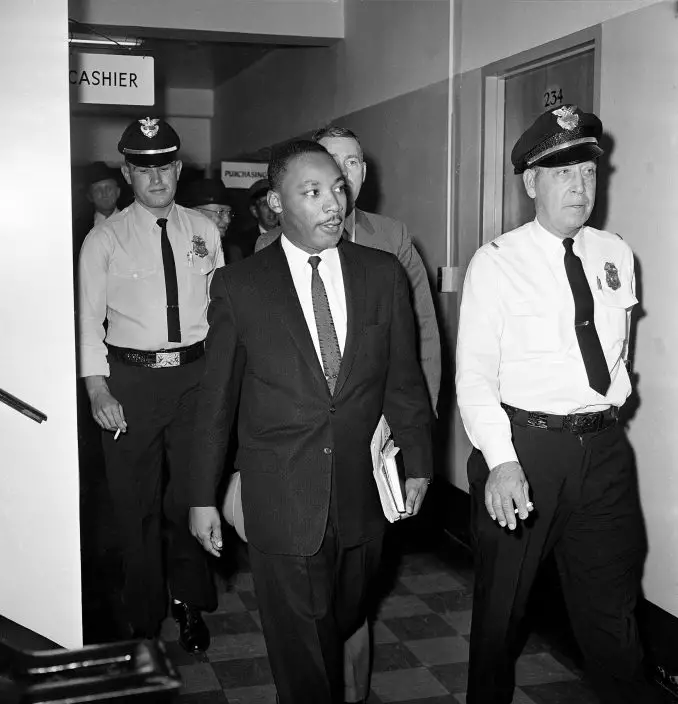
FILE - In this Oct. 25, 1960 file photo, Dr. Martin Luther King Jr. leaves court after being given a four-month sentence in Decatur, Ga., for taking part in a lunch counter sit-in at Rich's department store. Following the publication of "An Appeal for Human Rights" on March 9, 1960, students at Atlanta's historically black colleges waged a nonviolent campaign of boycotts and sit-ins protesting segregation at restaurants, theaters, parks and government buildings. (AP Photo, File)
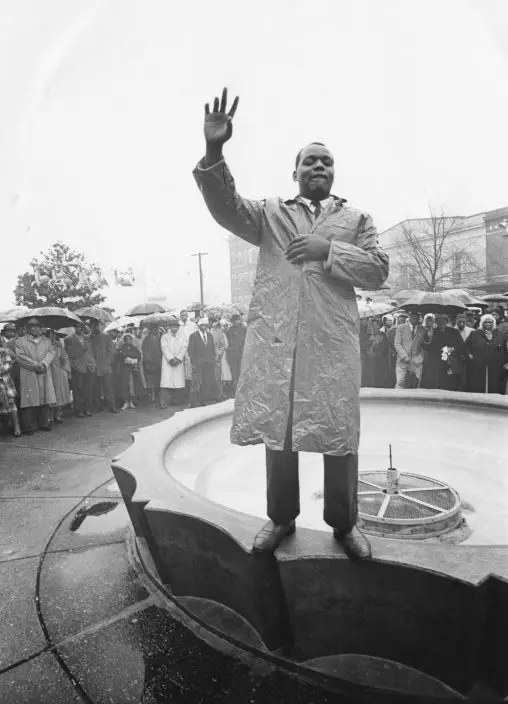
FILE - In this Dec. 12, 1960 file photo, Lonnie King, leader, of the Atlanta Student Movement addresses demonstrators in Atlanta in a group prayer before a protest against retail shops. Following the publication of "An Appeal for Human Rights" on March 9, 1960, students at Atlanta's historically black colleges waged a nonviolent campaign of boycotts and sit-ins protesting segregation at restaurants, theaters, parks and government buildings. (AP Photo, File)
Click to Gallery
FILE - In this March 16, 1960 file photo, Victor Cobb, right, the manager of a dining room in Atlanta's Trailways Bus Terminal, asks African American sit down demonstrators to leave his lunch counter, in Atlanta. Following the publication of "An Appeal for Human Rights" on March 9, 1960, students at Atlanta's historically black colleges waged a nonviolent campaign of boycotts and sit-ins protesting segregation at restaurants, theaters, parks and government buildings. (AP Photo, File)
FILE - In this Oct. 19, 1960 file photo, Dr. Martin Luther King Jr. under arrest by Atlanta Police Captain R.E. Little, left rear, passes through a picket line outside Rich's Department Store, in atlanta. On King's right are Atlanta Student Movement leader Lonnie King and Spelman College student Marilyn Pryce. Holding the sign is Spelman student activist Ida Rose McCree. Following the publication of "An Appeal for Human Rights" on March 9, 1960, students at Atlanta's historically black colleges waged a nonviolent campaign of boycotts and sit-ins protesting segregation at restaurants, theaters, parks and government buildings. (AP Photo, File)
FILE - In this Oct. 19, 1960 file photo, Dr. Martin Luther King Jr., right, looks out the window of a police car as he and Spelman College student Agnes Blondean Orbert, arrested with him at Rich's Department Store, are taken to jail, in Atlanta.. Driving the car is Atlanta Police Capt. R.E. Little. Following the publication of "An Appeal for Human Rights" on March 9, 1960, students at Atlanta's historically black colleges waged a nonviolent campaign of boycotts and sit-ins protesting segregation at restaurants, theaters, parks and government buildings. (AP Photo, File)
FILE - In this Oct. 25, 1960 file photo, Rev. Martin Luther King, Jr., integration leader, is escorted from the Atlanta, Ga. jail by two unidentified officers as he is taken to neighboring DeKalb county courthouse for a traffic hearing. Following the publication of "An Appeal for Human Rights" on March 9, 1960, students at Atlanta's historically black colleges waged a nonviolent campaign of boycotts and sit-ins protesting segregation at restaurants, theaters, parks and government buildings. (AP PhotoHorace Cort, File)
FILE - In this Oct. 20, 1960 file photo, Woolworth's customers closed its main downtown store in Atlanta., after white youth identified as Harold Sprayberry, 21, of Atlanta, walked along lunch counter area spraying insect repellent above heads of nearly 100 African Americans demonstrating at a sit-in for three hours. Following the publication of "An Appeal for Human Rights" on March 9, 1960, students at Atlanta's historically black colleges waged a nonviolent campaign of boycotts and sit-ins protesting segregation at restaurants, theaters, parks and government buildings. (AP PhotoHorace Cort, file)
FILE - In this March 16, 1960 file photo, Victor Cobb, right, the manager of a dining room in Atlanta's Trailways Bus Terminal, asks African American sit down demonstrators to leave his lunch counter, in Atlanta. Following the publication of "An Appeal for Human Rights" on March 9, 1960, students at Atlanta's historically black colleges waged a nonviolent campaign of boycotts and sit-ins protesting segregation at restaurants, theaters, parks and government buildings. (AP Photo, File)
FILE - In this May 17, 1960 file photo, state troopers stand guard at the state capitol, in Atlanta awaiting a scheduled march on the building by black demonstrators in observance of the sixth anniversary of the Supreme Court's school desegregation decision. Following the publication of "An Appeal for Human Rights" on March 9, 1960, students at Atlanta's historically black colleges waged a nonviolent campaign of boycotts and sit-ins protesting segregation at restaurants, theaters, parks and government buildings. (AP Photo, File)
FILE - In this May 17, 1960 file photo, a state trooper passes out billy clubs to other troopers as 2,000 blacks started a march toward the state capitol in Atlanta, in observance of the sixth anniversary of the U.S. Supreme Court's school desegregation decision. Following the publication of "An Appeal for Human Rights" on March 9, 1960, students at Atlanta's historically black colleges waged a nonviolent campaign of boycotts and sit-ins protesting segregation at restaurants, theaters, parks and government buildings. (AP PhotoHorace Cort, File)
FILE - In this Oct. 19, 1960 file photo, Dr. Martin Luther King Jr. under arrest by Atlanta Police Captain R.E. Little, left rear, passes through a picket line outside Rich's Department Store, in atlanta. On King's right are Atlanta Student Movement leader Lonnie King and Spelman College student Marilyn Pryce. Holding the sign is Spelman student activist Ida Rose McCree. Following the publication of "An Appeal for Human Rights" on March 9, 1960, students at Atlanta's historically black colleges waged a nonviolent campaign of boycotts and sit-ins protesting segregation at restaurants, theaters, parks and government buildings. (AP Photo, File)
FILE - In this Oct. 19, 1960 file photo, Black activists are seen picketing outside Rich's department store protesting against segregated eating facilities at one of its lunch counters in Atlanta, Ga. The activists who had taken seats inside the store were arrested. Following the publication of "An Appeal for Human Rights" on March 9, 1960, students at Atlanta's historically black colleges waged a nonviolent campaign of boycotts and sit-ins protesting segregation at restaurants, theaters, parks and government buildings. (AP Photo, File)
FILE - In this Oct. 19, 1960 file photo, Dr. Martin Luther King Jr., right, looks out the window of a police car as he and Spelman College student Agnes Blondean Orbert, arrested with him at Rich's Department Store, are taken to jail, in Atlanta.. Driving the car is Atlanta Police Capt. R.E. Little. Following the publication of "An Appeal for Human Rights" on March 9, 1960, students at Atlanta's historically black colleges waged a nonviolent campaign of boycotts and sit-ins protesting segregation at restaurants, theaters, parks and government buildings. (AP Photo, File)
FILE - In this Oct. 25, 1960 file photo, Rev. Martin Luther King, Jr., integration leader, is escorted from the Atlanta, Ga. jail by two unidentified officers as he is taken to neighboring DeKalb county courthouse for a traffic hearing. Following the publication of "An Appeal for Human Rights" on March 9, 1960, students at Atlanta's historically black colleges waged a nonviolent campaign of boycotts and sit-ins protesting segregation at restaurants, theaters, parks and government buildings. (AP PhotoHorace Cort, File)
FILE - In this Oct. 20, 1960 file photo, Woolworth's customers closed its main downtown store in Atlanta., after white youth identified as Harold Sprayberry, 21, of Atlanta, walked along lunch counter area spraying insect repellent above heads of nearly 100 African Americans demonstrating at a sit-in for three hours. Following the publication of "An Appeal for Human Rights" on March 9, 1960, students at Atlanta's historically black colleges waged a nonviolent campaign of boycotts and sit-ins protesting segregation at restaurants, theaters, parks and government buildings. (AP PhotoHorace Cort, file)
FILE - In this Oct. 25, 1960 file photo, Dr. Martin Luther King Jr. leaves court after being given a four-month sentence in Decatur, Ga., for taking part in a lunch counter sit-in at Rich's department store. Following the publication of "An Appeal for Human Rights" on March 9, 1960, students at Atlanta's historically black colleges waged a nonviolent campaign of boycotts and sit-ins protesting segregation at restaurants, theaters, parks and government buildings. (AP Photo, File)
FILE - In this Dec. 12, 1960 file photo, Lonnie King, leader, of the Atlanta Student Movement addresses demonstrators in Atlanta in a group prayer before a protest against retail shops. Following the publication of "An Appeal for Human Rights" on March 9, 1960, students at Atlanta's historically black colleges waged a nonviolent campaign of boycotts and sit-ins protesting segregation at restaurants, theaters, parks and government buildings. (AP Photo, File)























































